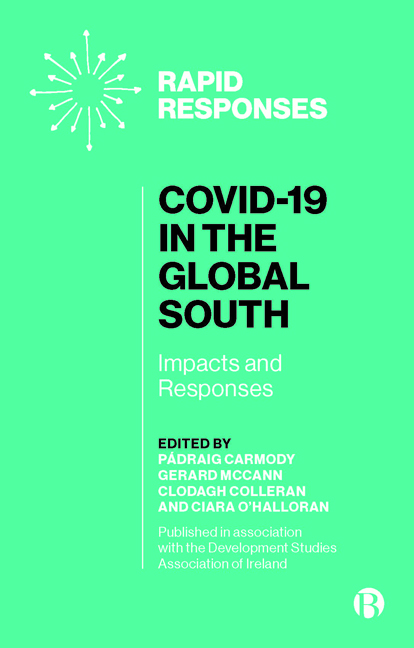2 - Climate Change and Coronavirus: A Confluence of Crises as Learning Moment
Published online by Cambridge University Press: 23 March 2021
Summary
A tale of two crises
2019 was the year of climate emergency declarations. Around the world, 1,750 jurisdictions in 30 countries declared states of emergency in response to a rapidly changing and increasingly volatile global climate so that, today, 820 million people, or one in ten people on the planet, live in places covered by climate emergency decrees (Climate Emergency Declaration, 2020). 2020 has brought the COVID-19 emergency. Declared a pandemic by the World Health Organization (WHO) in March 2020, COVID-19 has spread rapidly around the world with devastating impacts on human life patterns, livelihoods, everyday expectations and public health systems. The global economy has been brought to its knees.
The level of attention afforded to the coronavirus contagion has made it easy to overlook that, not so long ago, WHO (2015) identified climate change as the ‘greatest threat to global health in the 21st century’. On that account, some have adversely compared the ‘lacklustre’ or ‘faltering’ pursuance of climate change adaptation and mitigation with the intense and robust response to coronavirus across most jurisdictions (Paoletti and Vinke, 2020; The Lancet, 2020). The generally low visibility of climate change during the coronavirus crisis notwithstanding, the authors argue that the two crises share much by way of provenance and that, in their intersection, they are in many respects mutually exacerbating. The authors also argue that measures taken to allay either crisis can positively but also negatively impact on efforts to alleviate the other. In short, there is not only confluence but also collision. In studying current and emerging proposals and initiatives, the confluence of pandemic and climate breakdown is examined as presenting a potentially significant learning moment on the road to resilience.
Common provenance
Both crises are widely perceived as having their origins in human violation of nature (Kolinjivadi, 2020). Encroachment upon the natural world in the name of development is seen as escalating climate breakdown while opening the door to a succession of diseases with the potential to assume pandemic proportions. Unrelenting urbanization, mining, logging, development of transport infrastructure and ‘slash and burn’ agricultural expansion all degrade and shrink natural habitats and further reduce biodiversity.
- Type
- Chapter
- Information
- COVID-19 in the Global SouthImpacts and Responses, pp. 17 - 28Publisher: Bristol University PressPrint publication year: 2020
- 2
- Cited by



